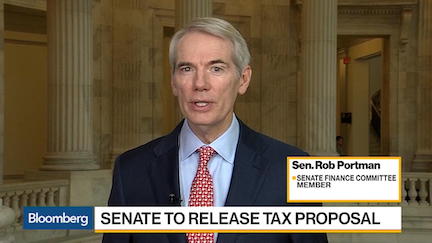Senators plan bipartisan revamp of national-security tariffs
A bipartisan group of senators introduced a bill to revamp a 1962 trade law that former President Donald Trump used to justify tariffs on billions of dollars worth of imports on national-security grounds.
Section 232 of the Trade Expansion Act allows for duties without a vote by Congress if imports are deemed a national-security threat. The Trump administration used the legislation to put tariffs on foreign steel and aluminum. Lawmakers complained about the White House’s actions, and the controversial duties have drawn legal challenges both in U.S. courts and at the World Trade Organization.
The proposed Trade Security Act would reform section 232 “to better align the statute with its original intent as a trade-remedy tool for the president and Congress to respond to genuine threats to national security,” seven senators including Republican Rob Portman of Ohio and Democrat Dianne Feinstein of California said in a statement Monday.

Congress would be able to annul the president’s actions with a joint resolution of disapproval, the lawmakers said, and the measure would require consultation with Capitol Hill throughout the process.
The law would also see the process split, with the Department of Defense leading an investigative phase and the Department of Commerce handling the so-called remedy phase “to ensure that the statute is used for genuine national-security purposes,” the senators said.
Other lawmakers backing the bill are Republicans Joni Ernst of Iowa, Deb Fischer of Nebraska, Roger Wicker of Mississippi and Todd Young of Indiana, as well as Democrat Kyrsten Sinema of Arizona.
In a separate statement on Monday, the Coalition of American Metals Manufacturers and Users, representing companies and workers in industries from aerospace to consumer goods, sent a letter to Commerce Secretary Gina Raimondo complaining about the damage caused by the 25% tariffs on steel and 10% on aluminum. Trump slapped the duties on trade partners from the European Union to Mexico and Canada in 2018.
Raimondo said earlier this month that data show the tariffs have “been effective” and left open the possibility that they would be maintained after the Biden administration completes a review process.
“Over 6.2 million Americans work in industries that use steel, while the steel industry itself directly employs only 141,700 workers,” the manufacturing group said. “The tariffs have shifted injury from one industry to a much broader segment of the economy.”
Similar Stories

December 2024 U.S. Transportation Sector Unemployment (4.3%) Was the Same As the December 2023 Level (4.3%) And Above the Pre-Pandemic December 2019 Level (2.8%)
View ArticleDP World appoints Jason Haith as Vice President of Freight Forwarding for U.S. and Mexico
DP World, a global leader in logistics and supply chain solutions, has announced the appointment of Jason Haith as Vice President, Commercial Freight Forwarding – U.S. and Mexico, effective immediately.…
View Article
Amaero secures final approval for $23.5M loan from Export-Import Bank
View ArticleU.S. Bureau of Labor Statistics employment situation
Total nonfarm payroll employment increased by 256,000 in December, and the unemployment rate changed little at 4.1 percent, the U.S. Bureau of Labor Statistics reported today. Employment trended up in…
View ArticleImport Cargo to remain elevated in January
A potential strike at East Coast and Gulf Coast ports has been avoided with the announcement of a tentative labor agreement, but the nation’s major container ports have already seen…
View ArticleS&P Global: 2025 U.S. transportation infrastructure sector should see generally steady demand and growth
S&P Global Ratings today said it expects activity in the U.S. transportation sector will continue to normalize in 2025, with growth rates for most modes of transportation slowing to levels…
View ArticleGet the most up-to-date trending news!
SubscribeIndustry updates and weekly newsletter direct to your inbox!





